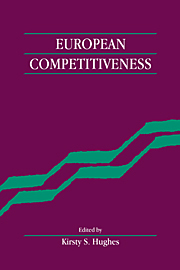Book contents
- Frontmatter
- Contents
- List of contributors
- Acknowledgements
- 1 Introduction: internationalisation, integration and European competitiveness
- Part 1 Internationalisation and corporate control
- Part 2 Technological specialisation and international trade
- Part 3 European integration and structural change
- 8 Mergers, acquisitions and the completion of the internal market
- 9 Growth, structural change and real convergence in the EC
- 10 Public services and competitiveness
- 11 Culture and competitiveness
- 12 Industrial policy and international competitiveness: the case of Eastern Europe
- Index
9 - Growth, structural change and real convergence in the EC
Published online by Cambridge University Press: 05 November 2011
- Frontmatter
- Contents
- List of contributors
- Acknowledgements
- 1 Introduction: internationalisation, integration and European competitiveness
- Part 1 Internationalisation and corporate control
- Part 2 Technological specialisation and international trade
- Part 3 European integration and structural change
- 8 Mergers, acquisitions and the completion of the internal market
- 9 Growth, structural change and real convergence in the EC
- 10 Public services and competitiveness
- 11 Culture and competitiveness
- 12 Industrial policy and international competitiveness: the case of Eastern Europe
- Index
Summary
Introduction
The purpose of this chapter is to consider the prospects for prosperity and the convergence of economic performance in the European Community (EC). The question of real and nominal convergence has been central to the EC since its formation but has been reiterated recently in both the discussion on 1992 and the gains from the completion of the internal market, and the debate on European Monetary Union. A key question surrounds the distribution of the gains. In order for there to be real convergence of per capita incomes across member states, the benefits of the internal market in terms of higher growth and higher productivity must be positively weighted towards the less prosperous countries (EUR 4: Greece, Ireland, Portugal and Spain). This paper is concerned with the theoretical and empirical conditions that must be met in order to guarantee the convergence of real per capita incomes.
The chapter is structured as follows. Section 9.2 outlines the recent historical record on economic performance and the convergence of real per capita incomes across member countries. Section 9.3 provides a theoretical discussion of the necessary conditions for the convergence to equilibrium characterised by the equality of factor returns across countries. In the light of these conditions the following section considers the empirical prospects for growth and convergence in the EC. It is shown that in respect of two of the four poorer countries of the Community, divergence of per capita incomes away from the EC average is the most likely outcome in the next few years.
- Type
- Chapter
- Information
- European Competitiveness , pp. 181 - 199Publisher: Cambridge University PressPrint publication year: 1993



